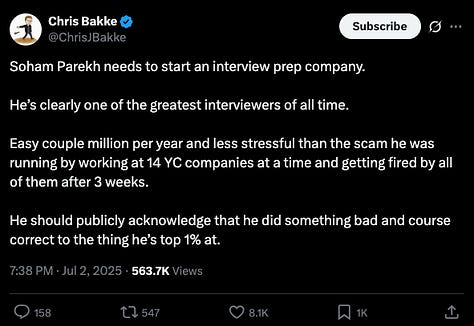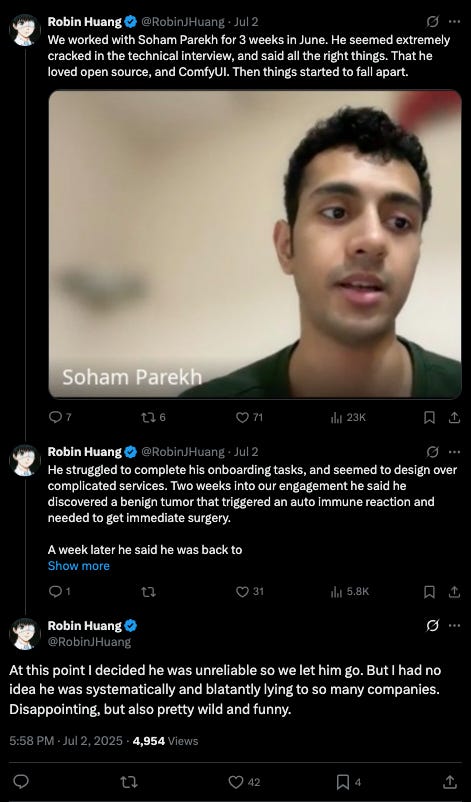Overemployment Is Having Its Coming Out Party
Soham Parekh gamed the system. But the real story is what his scandal reveals about the future of work, trust, and how we value time.
Hi, I’m Jamaal. Welcome to Jamaal’s Letter, where I share insights, predictions, and strong opinions on the future of markets, work, business, tech, and more.
The people who read this newsletter are the people who run the world. If you aren’t yet a subscriber, consider joining them by subscribing below. Please share it with your friends and colleagues if you find it helpful:
Read time: 5 minutes
The internet is abuzz over Soham Parekh, an Indian software engineer who has been accused of holding multiple full-time jobs at U.S. startups simultaneously. The story erupted online this week when Suhail Doshi, founder of Playground AI and former CEO of Mixpanel, hired and then fired Parekh within a week. Doshi said he discovered that Parekh's resume was largely fabricated, filled with fake companies and broken links. He posted the experience on X, and other founders quickly shared similar stories.
The incident quickly went viral. There were memes, hot takes, and even a response from LinkedIn’s CEO. Eventually, Parekh reached out to Doshi in private, asking whether he had completely sabotaged his career and how he might come clean.








In addition to jokes, the coverage so far has focused on the scandal and deception. But the more interesting story is what this episode reveals about remote work, overemployment, and how people are rethinking the structure of work itself.
Here’s what people are missing:
1. “Overemployment” is not going anywhere
What Soham did was dishonest. He faked credentials and provided fraudulent references. That part is not up for debate. But it would be a mistake to view this as representative of the broader movement toward overemployment, a pandemic-born phenomenon where people — typically remote, knowledge workers — hold two or more full-time jobs simultaneously, often without disclosing this to their employers.
Many workers today are exploring multiple sources of income at once. They are doing this openly or quietly, but almost always with good reason. In a world where remote work is the norm and job security feels fragile, diversifying income streams is not a scam. It is a smart move.
The backlash to Soham reflects an old belief that companies own their employees' time. That belief is starting to crumble. Remote work has shifted the value proposition. Workers are beginning to optimize for output rather than presence. If you can deliver what is asked of you, how you manage your time is increasingly your own business.
2. “Career Diversification” started as a side hustle and became a safety net
I’ve written extensively about how workers are increasingly noticing and resisting the fragility of relying on a single income. The overemployment trend started during the pandemic. Once people began working from home, many realized they had more free time than their jobs required. Some quietly took on second roles. Online communities, like Overemployed.com, emerged to offer advice and support.
Then came the tech layoffs. Since 2022, more than 640,000 tech workers have lost their jobs. These were not just any jobs. They were roles at companies that many thought were safe from market cycles. The lesson was clear. Even the best jobs come with risk.
What began as a strategy to earn extra income has evolved into a form of self-protection. People are no longer just side-hustling to get ahead. They are diversifying because they do not want to be caught flat-footed again.
3. This could still work in Soham’s favor
It is not hard to imagine a version of this story where Soham rebrands himself and lands in a better spot. We live in a time where attention can be more powerful than reputation. If he leans into the controversy, reframes it as a lesson or cautionary tale, and builds an audience around it, he could end up with more opportunities than before.
It would not be the first time someone turned notoriety into influence. There are entire businesses built on this playbook.
4. Verification systems are not built for this moment
One of the more unsettling elements of the Soham story is how easily he passed through multiple hiring processes. He appears to have invented companies, listed fake experience, and still got hired. His references reportedly checked out. It worked, at least for a while.
Now factor in the rise of generative AI. With the ability to fake resumes, references, video calls, and even voice interviews, the challenge is going to get harder. We already live in a world where AI can write emails, answer technical questions, and pass basic interviews.
It is not clear if Soham used AI. But even without it, this case shows that existing verification practices are falling behind. Hiring managers are flying blind in an environment that is changing faster than the systems they rely on.
5. The real issue isn’t overemployment, it’s underperformance
Employers who value output over time should not inherently have a problem with overemployment. If we take the logic of a truly free labor market seriously, then workers should be free to take on multiple roles, as long as they meet expectations. The controversy here is less about overemployment as a concept and more about the way Soham Parekh executed it.
In addition to allegedly fabricating credentials, Soham’s core failure was performance. His arrangement only unraveled because he overextended himself and failed to deliver. It is unclear how many jobs he held at once, but it appears he took on as many as he could string together before being let go by one and finding another. Had he been less greedy and focused on a smaller number of roles, he may have gone undetected—and more importantly, may have delivered real value to those companies.
The takeaway isn’t that overemployment is inherently unethical. It’s that quality still matters. The problem wasn’t that he worked too many jobs. It’s that he did too many jobs poorly.
Soham’s story is extreme. But it is also a warning. The conditions that allowed it to happen are not going away. If anything, they are becoming more common. Remote work, AI, and a shaky labor market are changing how people relate to work. This is not just a story about one engineer. It is a glimpse into what is coming next.
If you're interested in the future of work, this is a signal worth paying attention to.





